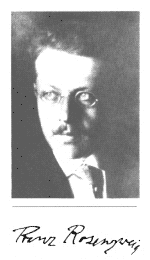 The Gifts of the German Jews:
The Gifts of the German Jews:Toward a Postmodern Judaism
Last month's discussion in Zeek of Douglas Rushkoff's work highlighted the problem that we "lapsed" Jews face when trying to find a meaningful and "authentic" relationship with Jewish tradition. For Rushkoff, one must dismiss the Torah's authority in order to be true to its higher purposes. "Authentic" Judaism means treating the religion as a computer program with open source code and hacking into it. Executing the Torah's 'command lines' or believing in any of its contents are, to some extent, inauthentic.
Whatever my disputes with Rushkoff's scholarship, I find this view of Judaism to be personally unacceptable. For me, a relationship to Judaism can only have meaning if it both recognizes the tradition's authority while at the same time allowing the individual to retain the self-conscious autonomy that modernity, and to some extent postmodernity, requires. Our recognition that the Law has some claim over us (if not juridical, then at least cultural, intellectual, or psychological) makes us Jews. But what kind of meaning can a tradition have for us if we do not believe its claims to authority? How can we live by the Law if we are not convinced that we can know it? How can we feel "authentic" if we recognize the motivating role played by nostalgia and even guilt? In the words of Arnie Eisen, American Jews
| face the problem of having to justify to themselves how they can locate authority in "the tradition" despite the awareness that the past to which one appeals is, to a significant degree, a patchwork product of one's own construction, selected from a large number of pasts potentially available for use. How can one simultaneously and with utter self-consciousness both read into and read out of the "sources of Judaism"? How simultaneously "invent" the past and invoke its authority? |
Several projects of modern Judaism have sought to resolve away these problems. Reform Judaism attempted to do so by denuding the tradition of the Law and recasting its ethical 'core' as identical to modern values. Orthodoxy for the most part responded by denying modernity while evoking the authority of miracles and faith. Conservative Judaism and Modern Orthodoxy struggle to accommodate, to varying degrees, the demands of both the normative Law and an engaged modern life.
Postmodern Judaism, in contrast to all of the above, does not try to resolve the tension at all. The strand of it that I understand recognizes the truth that lies within a tradition but also cannot or will not accept any given tradition (including that of modernity) as the truth. We are free to select one tradition, and one narrative, over others, but only self-consciously, fully aware that our choice was no more true than any of the others we might have selected. In part this is because of our skepticism regarding truth in general, and in part it is because we are too aware of the fact that traditions in particular, despite their appearance of being immutable, are and have been invented by each generation that has inherited them.



The Queer Guy at the Strip Club
Jay Michaelson
The Gifts of the German Jews: Toward a Postmodern Judaism
Michael Shurkin
My first shabbos
Jennifer Waters
Stones of Jerusalem
David Goldstein
Holocaust Video Testimonies: The Other Reality TV
Dan Friedman
Josh Tells a Bedtime Story
Josh Ring
Zeek in Print
Buy online here
Saddies
David Stromberg
About Zeek
The Zeek Archive
Links
From previous issues:
Reinventing the Wheel
Michael Shurkin
The Sacred and the Profane
Douglas Rushkoff and Jay Michaelson
A review of Douglas Rushkoff's Nothing Sacred